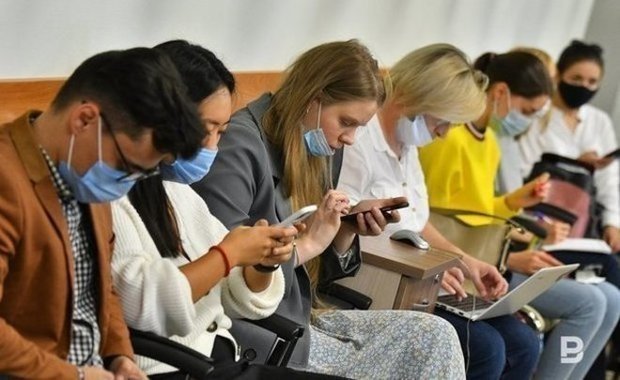Leonid Delitsyn: ‘Developers are afraid that Cisco, Juniper, Microsoft and SAP will return in a year or two’
Analyst of FG Finam — about situation in Russian IT sector
Most of the IT specialists who left the country have returned to Russia, Vladimir Putin stated. Nevertheless, experts doubt that this will help the Russian market to develop successfully. “There is an opportunity to occupy the vacant niches, but developers are afraid that Cisco and Juniper, Microsoft and SAP will return in a year or two, and everything will return to normal," said Leonid Delitsyn, an analyst at Finam. He assesses the current situation and prospects in the Russian IT sector in the author's column for Realnoe Vremya.
Developers fear that Cisco, Juniper, Microsoft and SAP will return
The current season may be fruitful for new IT companies. The wave of registrations of new IT companies is connected with the hopes of large corporations for state support. The state policy of import substitution has received a geopolitical incentive — foreign hardware and software are simply leaving our market. There is an opportunity to occupy the vacant niches, but developers are afraid that Cisco and Juniper, Microsoft and SAP will return in a year or two, and everything will return to normal.
The state is going to provide accredited IT companies with the benefits listed on the website of the Ministry of Digital Development. Reduced insurance premiums for mandatory pension and medical insurance are offered, and there is also a preferential income tax rate. But what is an IT company? Such organisations are considered to have passed state accreditation as IT companies. And the company's activities should relate to one of the seven relevant points of the OKVED classifier, where they are all listed. If a company develops or implements computing equipment and software, then it belongs to the IT industry.

Telecom operators, without waiting for sanctions, diversified the composition of suppliers
Stimulation is likely to overtake everyone, but not all at once. There are no plans to support the telecommunications industry immediately. The income tax rate will not be reduced, there will be no moratorium on deductions to reserves, and there will be no preferential loans either. The situation is reminiscent of the Italian comedy “Mr. Robinson”, popular in Soviet times, where the main character who loses the competition receives a stimulating prize from the leader of a local tribe, and the winner is left with nothing, because he is already quite a brave and agile warrior.
Telecom operators, without waiting for sanctions, diversified the composition of suppliers. And when the withdrawal of Western suppliers accelerated, the stocks of components for equipment repair increased.
Most operators reported that they would hang on for a year on what they have. They took loans from Russian banks, and the revocation of credit ratings by Western agencies does not change anything for them. They even pay dividends one by one, while in other industries they refuse to do so. MTS, for example, will pay dividends in the aggregate amount of 66,33 billion rubles. Tattelecom will pay dividends with a yield of 6,4%. The decision to pay dividends was made by telecom for a reason. It is important for them to maintain capitalisation now, so as not to worsen loan conditions. They will probably need large loans in a year when they need to purchase new equipment, and it can become much more expensive.

Another trend is the concentration on core competencies and the refusal to grow in breadth. There are many examples. Rostelecom has agreed with the National Media Group (NMG) on the merger of the Wink and more.tv video services owned by them accordingly. The share of Rostelecom in the joint venture will be 70%, the share of NMG — 30%. The joint company, which will operate under the Wink brand and will occupy about 15% of the online cinema market, can now be estimated at 12-15 billion rubles. The strategic goal is the production of original content, and, obviously, it is not Rostelecom that will be engaged in film production, but NMG.
By the way, the main pain of the domestic film businesses is sanctions on Western content. The former minister of culture even suggested saving traditional cinemas with the help of parallel imports. New domestic content gets a chance to become in demand, and Rostelecom can ensure its delivery without deviating to foreign filmmaking.
IT players are preparing for deals
Other domestic IT giants are also actively preparing deals. The potential transfer of the Delivery Club from the hands of VK and Sber to the hands of Yandex, in a package with a number of other assets and in exchange for Yandex.News and Yandex.Zen is widely discussed. The Food Delivery Club project, according to some estimates, occupies the largest share in this market, but does not fit into the changed strategies of the previous owners. They could not create a genuine ecosystem of projects from which it would be possible to extract synergies that would reduce costs and erect insurmountable barriers for competitors. They do not have time for this now. And Yandex is persistent in striving to gain a foothold in the e-commerce market, and its transport and logistics projects are clearly integrated with online commerce. By acquiring Delivery Club (which, due to the situation, can now be bought profitably), the IT giant will dominate the delivery market. By itself, this market is unlikely to become profitable, even the question of its payback is controversial. But for Yandex, this is part of a mechanism that allows it to keep the user in 24/7 mode and study their needs. This path has already been tested by the Chinese search engine Baidu and its competitors, Alibaba and Tencent, who are trying not to let the consumer out of the web of their services for a second.
By the way, food delivery benefits for IT companies do not apply. In general, this is quite logical, since food delivery is not information processing, equipment creation or software development. However, the deputy finance minister's comment that there would be no benefits because the marginality of taxi and delivery services is already high is not entirely clear. It is, in general, now negative. Although, perhaps, the ministry expects the establishment of a monopoly in these markets and a return to the days when the taxi driver was a wealthy specialist.
Besides, in June, Yandex successfully completed the story with the redemption of bonds. For every $200,000 of the nominal value of the bonds, Yandex paid $140,000 in cash and attached 957 of its shares. At first glance, the offer did not look particularly profitable, but 93% of bondholders immediately agreed. This is a good sign that they all believe in the recovery of the Yandex stock price in the medium term (in this case, they get a good profit).
Reference
The author's opinion may not coincide with the position of the editorial board of Realnoe Vremya.